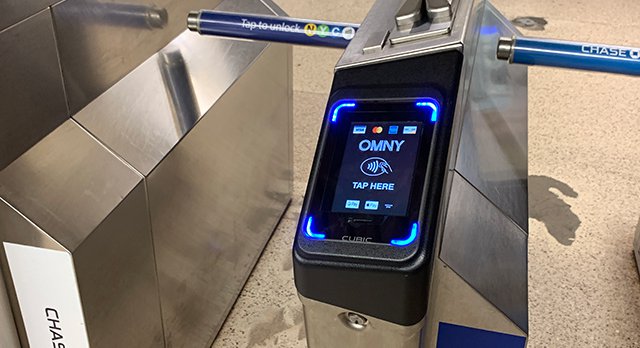The MTA is planning to introduce a fare-capping pilot this spring for weekly OMNY passes — an effort to reward riders who use the new tap-and-go system, which currently doesn’t have any unlimited plans.
The pilot, which the MTA shared with the New York Times before discussing it publicly, would give riders who spend more than $33 in a single week — from Monday at 12 a.m. to Sunday just before midnight — a weekly unlimited pass for that time period. That’s the equivalent of 12 rides at $2.75, so the savings kick in for OMNY users who use the subway 13 times or more during the seven-day period.
The program, which is open to all OMNY users, is slated to begin on March 1, 2022 and will last for four months.
The new push follows the governor’s announcement in November that there would be no fare hikes until 2023 and no service cuts either — part of the MTA’s ongoing effort to bring ridership levels close to pre-pandemic levels. While the MTA broke pandemic-level ridership records last week, with more than 3 million daily users every weekday, it’s still not close to the 5.5 million daily subway riders the MTA saw before COVID.
Acting MTA chairman Janno Lieber told the Times that the fare capping pilot program could cost the agency between $3 million to $5 million a month in lost daily fares, but the chance to entice riders back into the system is worth it. A recent MTA survey found that many lapsed riders had a negative perception of the subway system, but once they took the subway again, riders were more likely to keep riding.
Advocacy group TransitCenter conducted a survey in 2019 that found people who live in lower-income neighborhoods use the 7-day unlimited more than the 30-day unlimited card. The group recommends the MTA adopt both a 7- and a 30-day fare capping program.
“So a lot of the value of fare capping would accrue to riders who can afford the 7-day pass but not the 30-day pass. That only works if there’s a 30-day option, though — those riders don’t benefit from a fare capping program that only kicks in for a 7-day period,” Ben Fried of Transit Center wrote in a statement. “The caveat is that we don’t have COVID-era data yet, so the types of fare passes people are buying have probably shifted somewhat. But the same basic idea applies no matter what — it’s not a full fare capping program, with all the benefits that entails, without a 30-day option.”
State Senator Andrew Gounardes introduced legislation this fall that would cement capping as part of the MTA’s fare structure.
“A pilot to continue the unlimited transit fare system under OMNY is a good start but it needs to be made permanent. My bill will ensure that this happens,” Gounardes wrote in a statement. “Mandating this savings program will incentivize ridership and continue to make the subway an affordable option for New Yorkers.”
Assembly Member Robert Carroll, co-sponsor of the bill, added it would prevent the MTA from reneging on this plan.
“ We should still work to pass this legislation so that we don’t backslide or regress when ridership rebounds, and suddenly the MTA decides to no longer offer a monthly or weekly option,” Carroll said.
Carroll said the MTA should go further and look at a yearly option, in an effort to get companies to bring their workforce back to work on mass transit.
The MTA board will vote on the pilot Wednesday.
